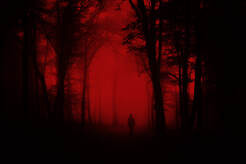 I recently wrote a novel entitled The Proxima Plague and received a review that mentioned the novel as "horror". While I didn't think of the book as a horror story while writing it, I began to wonder: Why do we love scary stories? After all, our natural reaction to scary things is the so called "fight or flight" response: a surge of adrenalin which allows us to survive an existential threat by either runny away or attacking the peril head on. The threat may be dealt with but, afterwards we're left shaken and drained. Some psychologists and aficionados of the genre would tell us that we enjoy them for the adrenalin rush similar to the feeling we get on riding a roller coaster with the near ninety degree drop. Afterwards we become more alive thanks to a quickened pulse and shaky knees. A different take on the after effects of that adrenalin rush. Or, it may be the closeness some couples feel after experiencing a horror movie. Yeah, who would have thought that watching Jason slice up a dozen or so bodies could be a bonding experience? An even darker explanation is we like seeing the blood and gore. Perhaps that's why each new generation of horror movies seems to ratchet up the cartoonish violence and body count over the previous crop. There may be another reason for our love of fright: it helps us face our fears. Since we are thinking rational animals we learn from bad experiences. And I guess watching a scary movie or reading a horror novel could be classified as vicariously living through a bad experience. So, how does it help us face our fears?
0 Comments
 Honestly, I started it before the beginning of 2020. My initial outline involved my heroine infiltrating an underground cabal selling medical research to find a cure for an ailing child. But, it was missing something—not enough conflict and high enough stakes. So what if she steals vital information and is chased by the bad guys? It’s been done before. I needed something unique, something with really high stakes. Then it hit me. What if the illness my heroine sought to cure was a heretofore unknown virus that didn’t just affect one person but the entire planet? And not just a flu-like illness but a universally fatal illness that caused a small subset of patients to morph into near supernatural creatures. There, I had it. The stakes were raised about as high as they could be: solve the problem or face extinction. With outline in hand I did some research on epidemics, the CDC, and viruses and began to write. As I started writing it happened. The Covid-19 pandemic began. I was writing about a fictional pandemic during an actual one. Let me stop right here to say that I’m not bragging that I in any way foreknew that Covid was coming. It was a coincidence. I was as shocked by the turn of events as anyone else. Now, the burning question was should I stop writing about a fictional pandemic during an actual pandemic? After all, real people were getting sick and dying. At the time I was working part time as a hospitalist. The VA hospital I worked in was not on the frontlines of the fight against Covid, but still the risk always loomed as we were required to don N-95 masks, face shields, gowns, and gloves to see new admissions. I asked a couple of physician colleagues what they thought about me continuing to write after sharing the storyline. Both were intrigued by the plot and responded with an enthusiastic yes, I should continue writing. My writing in a strange way helped me cope with the uncertainty and isolation that accompanied the early days of the pandemic. I suppose a way of facing your fears is to write about them. This is why journaling is considered a healthy way to cope with stress and anxiety. The compelling theme—love and sacrifice—was something I wanted to explore in the context of a pandemic. This also drove me to continue to write. Lastly, the precedent of famous writers played a part. Daniel Defoe and Albert Camus both wrote eloquently about plagues. I recently completed my novel, entitled THE PROXIMA PLAGUE. It was a wild exhausting ride chronicling the tragedy and triumphs of my heroine caught up in a pandemic all the way to the fantastical denouement. Check it out. I think you might like it. |
Archives
June 2023
Categories |
 RSS Feed
RSS Feed